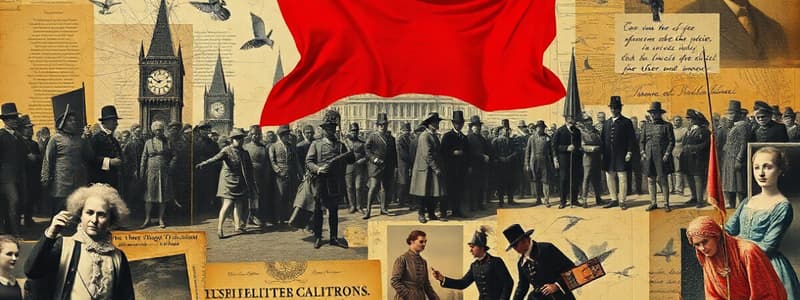Podcast
Questions and Answers
Which of the following best describes the composition of the Third Estate in pre-revolutionary France?
Which of the following best describes the composition of the Third Estate in pre-revolutionary France?
- Vast majority of the population, including peasants and commoners. (correct)
- Primarily members of the clergy and religious figures.
- Exclusive representation of the nobility and aristocracy.
- Delegates from the Estates General
How did the heavy taxation, such as the Taille, contribute to the onset of the French Revolution?
How did the heavy taxation, such as the Taille, contribute to the onset of the French Revolution?
- It fostered economic growth and stability among the Third Estate.
- It evenly distributed wealth and resources among the three estates.
- It fueled dissatisfaction and unrest among the common people due to financial burden. (correct)
- It promoted cooperation between the monarchy and the Estates General.
What was the primary purpose of convening the Estates General by King Louis XVI in 1789?
What was the primary purpose of convening the Estates General by King Louis XVI in 1789?
- To reinforce the privileges and exemptions enjoyed by the nobility and clergy.
- To celebrate the achievements and successes of the French monarchy.
- To suppress dissent and maintain the status quo through absolute monarchical power.
- To address the economic crisis and seek solutions for France's financial problems. (correct)
Which of the following actions by the National Assembly marked a turning point during the French Revolution, symbolizing the end of absolutism?
Which of the following actions by the National Assembly marked a turning point during the French Revolution, symbolizing the end of absolutism?
How did the disparities in living conditions between the estates contribute to the French Revolution?
How did the disparities in living conditions between the estates contribute to the French Revolution?
How did the rise of Napoleon Bonaparte relate to the consequences of the French Revolution?
How did the rise of Napoleon Bonaparte relate to the consequences of the French Revolution?
Why is the French Revolution considered a pivotal moment in world history?
Why is the French Revolution considered a pivotal moment in world history?
During the Reign of Terror, what was the primary method used by the Jacobins to suppress opposition?
During the Reign of Terror, what was the primary method used by the Jacobins to suppress opposition?
Flashcards
Three Estates
Three Estates
The social classes in pre-revolutionary France: clergy, nobility, and commoners.
Taille
Taille
A land tax imposed on the Third Estate in France.
Estates General
Estates General
A representative assembly in France, consisting of the three estates.
Reign of Terror
Reign of Terror
Signup and view all the flashcards
Execution of King Louis XVI
Execution of King Louis XVI
Signup and view all the flashcards
Social Inequality
Social Inequality
Signup and view all the flashcards
Contributions to the Revolution
Contributions to the Revolution
Signup and view all the flashcards
Consequences of the Revolution
Consequences of the Revolution
Signup and view all the flashcards
Study Notes
The French Revolution: Causes
- A period of significant political and social change in France.
- People challenged existing social order for a more just society.
- French society divided into three estates:
- First Estate: Clergy (Church members)
- Second Estate: Nobility
- Third Estate: Peasants and commoners (vast majority)
- Taxation was a major issue, primarily impacting the Third Estate.
- Taille (land tax) added to financial burdens.
- High taxes and lack of representation fueled growing dissatisfaction.
Causes of the Revolution (cont.)
- Bad harvests and rising food prices (bread) caused hardship.
- Third Estate demanded equality and an end to nobility's privileges.
Estates General
- Representative body from all three estates.
- Convened by King Louis XVI in 1789.
- Called to address France's economic crisis.
Reign of Terror
- The Jacobins, a radical group, seized control during the National Convention.
- Implemented a period of extreme violence.
- Severe punishment for those who opposed the revolution.
Execution of King Louis XVI
- King Louis XVI executed in January 1793.
- Executed for treason and attempting to regain power.
Pre-Revolution Living Conditions
- Significant disparities between the estates (social classes)
- Nobility and clergy had privileges and exemptions.
- Common people faced heavy financial burdens and social inequality.
Consequences of the Revolution
- Rise of Napoleon Bonaparte.
- Establishing a new order based on liberty, equality, and fraternity.
- Monarchy abolished.
- Deeply impacted the political and social landscape globally.
- A pivotal moment in history, still studied today.
Studying That Suits You
Use AI to generate personalized quizzes and flashcards to suit your learning preferences.




